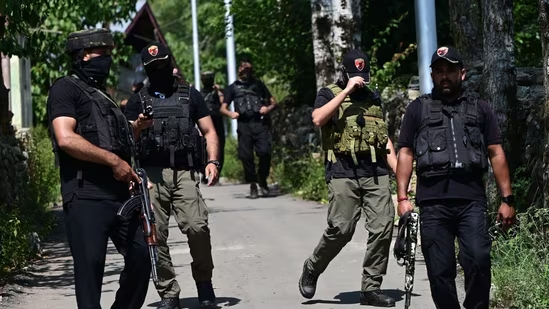
Suleiman Shah
In a significant blow to terrorism in the Kashmir Valley, security forces neutralized Suleiman Shah, a top terrorist affiliated with the Pakistan-based terror outfit Lashkar-e-Taiba (LeT), during a high-stakes encounter in Pahalgam, Jammu and Kashmir. Shah had emerged as one of the most wanted militants in the region and was believed to be the mastermind behind several attacks on security forces and civilians.
Here are five key facts that reveal who Suleiman Shah was, and why his elimination is being hailed as a major counter-terrorism success:
1. Pakistani National with Deep Terror Links
Suleiman Shah was a foreign terrorist from Pakistan, believed to be in his late 30s, who infiltrated into India several years ago. Intelligence reports indicate that he had received training at terrorist camps across the Line of Control (LoC) and had close ties with top LeT commanders, including those operating out of Rawalpindi and Muzaffarabad.
According to officials, Shah was instrumental in reviving the Lashkar-e-Taiba network in South Kashmir, and worked as a key handler for new recruits. His familiarity with the terrain and locals gave him an edge in evading security forces for years.
2. Mastermind Behind the Pahalgam Attack
Suleiman Shah was allegedly the chief orchestrator of the recent Pahalgam terror attack, in which two army personnel were martyred and several others injured when militants ambushed a convoy. The attack created panic in the tourist-heavy region, raising fears of renewed militancy in southern Kashmir.
Officials believe Shah handpicked and trained the module responsible for the attack, using guerrilla warfare tactics and exploiting forest cover to strike and escape. The intelligence gathered post-attack eventually led to the encounter that neutralized him.
3. Operating Under Multiple Aliases to Avoid Detection
One of the biggest challenges in tracking Suleiman Shah was his use of multiple fake identities and local sympathizers to hide his movements. He was reportedly using aliases such as “Abu Zarar” and “Hammad Bhai” to mislead security agencies.
Despite being a foreign national, Shah blended in with locals by wearing traditional Kashmiri attire and speaking basic Kashmiri, which allowed him to evade surveillance and intelligence radar for a considerable period.
4. Key Recruiter and Radicalizer in South Kashmir
Apart from being a front-line militant, Suleiman Shah played a crucial role in radicalizing Kashmiri youth, luring them into joining the Lashkar-e-Taiba’s ideology of jihad. He was said to be active on encrypted messaging platforms, where he would communicate with prospective recruits, share radical content, and provide instructions for local terror strikes.
His ability to indoctrinate young minds was considered more dangerous than his direct involvement in terror activities. As per security sources, Shah had created multiple sleeper cells across Anantnag, Pulwama, and Kulgam, many of which are now under close watch after his death.
5. Neutralized in a High-Risk Joint Operation
Suleiman Shah was killed in a joint operation carried out by the Indian Army, CRPF, and Jammu & Kashmir Police in the high-altitude forests of Pahalgam. The operation, based on specific intelligence inputs, lasted several hours and involved intense gunfire.
Two AK-47 rifles, grenades, and Pakistani-made equipment were recovered from the site, confirming Shah’s identity and foreign origin. His death is being seen as a major success for counter-terrorism efforts in the valley, particularly ahead of the Amarnath Yatra and upcoming elections, which have always been targets for terrorist disruption.
Why His Elimination Matters
The killing of Suleiman Shah marks a strategic victory for Indian forces in their ongoing campaign against foreign-sponsored terrorism. His death disrupts a significant node in the Lashkar-e-Taiba’s Kashmir operations and sends a message to other infiltrators that Indian security forces remain vigilant and effective.
Moreover, it showcases the enhanced coordination between military and intelligence agencies, and the growing reliance on precise, intelligence-based operations to avoid civilian casualties.
Conclusion: A Blow to Pakistan-Backed Terrorism
Suleiman Shah’s elimination isn’t just the end of a militant — it represents a dent in the broader infrastructure of Pakistan-backed terrorism that continues to destabilize Jammu and Kashmir. His radical influence, operational expertise, and cross-border links made him a high-value target.
While the fight against terrorism is far from over, this encounter reiterates India’s commitment to neutralizing threats before they can harm innocents, and ensuring that peace and normalcy return to the region that has long been marred by violence.
Thanks For Reading